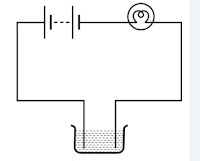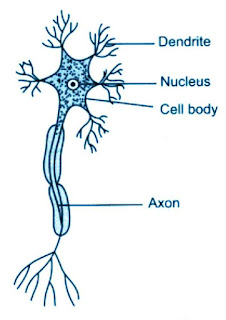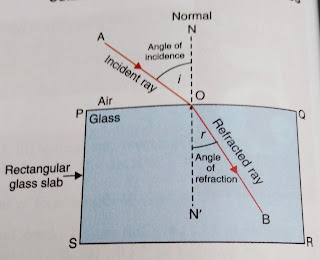NCERT Solutions for Class 8 Science Ch 14- Chemical Effect of Electric Current
Your NCERT Solution for class 8 of science subject named Chemical Effects of Electric Current chapter 14 discusses here about all questions answers.
NCERT Book Solution Page 180
Question 1:
Fill in the blanks
(a) Most liquids that conduct electricity are solutions of _________, __________ and ________.
(b) The passage of an electric current through a solution causes ____________ effects.
(c) If you pass current through copper sulphate solution, copper gets deposited on the plate connected to the ____________ terminal of the battery.
(d) The process of depositing a layer of any desired metal on another material by means of electricity is called ____________.
Answer
Fill in the blanks
(a) Most liquids that conduct electricity are solutions of acids, bases and salts.
(b) The passage of an electric current through a solution causes chemical effects.
(c) If you pass current through copper sulphate solution, copper gets deposited on the plate connected to the negative terminal of the battery.
(d) The process of depositing a layer of any desired metal on another material by means of electricity is called electroplating.
NCERT Book Solution Page 180
Question 1:
Fill in the blanks
(a) Most liquids that conduct electricity are solutions of _________, __________ and ________.
(b) The passage of an electric current through a solution causes ____________ effects.
(c) If you pass current through copper sulphate solution, copper gets deposited on the plate connected to the ____________ terminal of the battery.
(d) The process of depositing a layer of any desired metal on another material by means of electricity is called ____________.
Answer
Fill in the blanks
(a) Most liquids that conduct electricity are solutions of acids, bases and salts.
(b) The passage of an electric current through a solution causes chemical effects.
(c) If you pass current through copper sulphate solution, copper gets deposited on the plate connected to the negative terminal of the battery.
(d) The process of depositing a layer of any desired metal on another material by means of electricity is called electroplating.
You May Like:
1. MCQ Questions for Class 8 Science Chapter 14 Chemical Effects of Electric Current with Answers
2. MCQ Questions for Class 8 Science Chapter 13 Sound with Answers
2. MCQ Questions for Class 8 Science Chapter 13 Sound with Answers
Question 2:
When the free ends of a tester are dipped into a solution, the magnetic needle shows deflection. Can you explain the reason?
Answer: deflection of magnetic needle shows that current pass through it. It means the solution is a good contactor of electricity due to which, when the ends of a tester are dipped into that solution a complete circuit is formed and electricity pass through it.
Question 3:
Name three liquids, which when tested in the manner shown in Figure, may cause the magnetic needle to deflect.
Answer:
The three liquids are acidified water, vinegar, lemon juice.
NCERT text book Solution page 181
Question 4:
The bulb does not glow in the setup shown in Figure. List the possible reasons. Explain your answer.
Answer:
(i) the liquid is not an electrolyte.
(ii) the bulb is fused
(iii) the circuit is open
(iv) the battery is already exhausted.
Question 5:
A tester is used to check the conduction of electricity through two liquids, labelled A and
B. It is found that the bulb of the tester glows brightly for liquid A while it glows very
dimly for liquid B. You would conclude that
(i) liquid A is a better conductor than liquid B.
(ii) liquid B is a better conductor than liquid A.
(iii) both liquids are equally conducting.
(iv) conducting properties of liquid cannot be compared in this manner.
Answer:
(i) Liquid A is a better conductor than liquid B.
Question 6:
Does pure water conduct electricity? If not, what can we do to make it conducting?
Answer 6:
Scenes in pure water there is no ions present in it, pure water does not conduct electricity.
To conduct electricity through water we have to add some acid or alkaline or salt in it
Question 7:
In case of a fire, before the firemen use the water hoses, they shut off the main electrical supply for the area. Explain why they do this.
Answer 7: since naturally occurring water is impure, so it conduct electricity. For this reason firemen first shut off the main electrical supply to save themselves and others from electric shock and avoid any short circuit.
Question 8:
A child staying in a coastal region tests the drinking water and also the seawater with his tester. He finds that the compass needle deflects more in the case of seawater. Can you explain the reason?
Answer 8:
Drinking water is produced by various purification process, in which maximum impuritied present in water are removed out. So drinking water contain lesser ions.
Whereas, in seawater, there is lots of salt present in it and hence it contain much more ions.So the child sees more deflection in magnetic needle in case of sea water.
Question 9:
Is it safe for the electrician to carry out electrical repairs outdoors during heavy downpour? Explain.
Answer 9:
No it is very risky and unsafe to carry out electric repairs outdoors during heavy downpour. Water (when impure)is a good conductor of electricity and there are chances of getting electric shock.
Question 10:
Paheli had heard that rainwater is as good as distilled water. So she collected some rainwater in a clean glass tumbler and tested it using a tester. To her surprise she found that the compass needle showed deflection. What could be the reasons?
Answer 10:
when rain water passes through the atmosphere various impurities like gases dust particles which are present in atmosphere mixed with rainwater. As a result rainwater behave as a good conductor of electricity.
Question 11:
Prepare a list of objects around you that are electroplated.
Answer 11:
Cold drink cans are tin plated. Artificial Jewellery items are silver or gold-plated. Car bumpers.
Question 12:
The process that you saw in Activity 14.7 is used for purification of copper. A thin plate of pure copper and a thick rod of impure copper are used as electrodes. Copper from impure rod is sought to be transferred to the thin copper plate. Which electrode should be attached to the positive terminal of battery and why?
Answer 12:
Since copper is a metal and metal forms positive ion that is cation. Cation goes to cathode. So thin pure copper strip attach to negative terminal of battery and impure copper strip should be attached to the positive terminal of the battery.
When the free ends of a tester are dipped into a solution, the magnetic needle shows deflection. Can you explain the reason?
Answer: deflection of magnetic needle shows that current pass through it. It means the solution is a good contactor of electricity due to which, when the ends of a tester are dipped into that solution a complete circuit is formed and electricity pass through it.
Question 3:
Name three liquids, which when tested in the manner shown in Figure, may cause the magnetic needle to deflect.
Answer:
The three liquids are acidified water, vinegar, lemon juice.
NCERT text book Solution page 181
Question 4:
The bulb does not glow in the setup shown in Figure. List the possible reasons. Explain your answer.
Answer:
(i) the liquid is not an electrolyte.
(ii) the bulb is fused
(iii) the circuit is open
(iv) the battery is already exhausted.
Question 5:
A tester is used to check the conduction of electricity through two liquids, labelled A and
B. It is found that the bulb of the tester glows brightly for liquid A while it glows very
dimly for liquid B. You would conclude that
(i) liquid A is a better conductor than liquid B.
(ii) liquid B is a better conductor than liquid A.
(iii) both liquids are equally conducting.
(iv) conducting properties of liquid cannot be compared in this manner.
Answer:
(i) Liquid A is a better conductor than liquid B.
Question 6:
Does pure water conduct electricity? If not, what can we do to make it conducting?
Answer 6:
Scenes in pure water there is no ions present in it, pure water does not conduct electricity.
To conduct electricity through water we have to add some acid or alkaline or salt in it
Question 7:
In case of a fire, before the firemen use the water hoses, they shut off the main electrical supply for the area. Explain why they do this.
Answer 7: since naturally occurring water is impure, so it conduct electricity. For this reason firemen first shut off the main electrical supply to save themselves and others from electric shock and avoid any short circuit.
Question 8:
A child staying in a coastal region tests the drinking water and also the seawater with his tester. He finds that the compass needle deflects more in the case of seawater. Can you explain the reason?
Answer 8:
Drinking water is produced by various purification process, in which maximum impuritied present in water are removed out. So drinking water contain lesser ions.
Whereas, in seawater, there is lots of salt present in it and hence it contain much more ions.So the child sees more deflection in magnetic needle in case of sea water.
Question 9:
Is it safe for the electrician to carry out electrical repairs outdoors during heavy downpour? Explain.
Answer 9:
No it is very risky and unsafe to carry out electric repairs outdoors during heavy downpour. Water (when impure)is a good conductor of electricity and there are chances of getting electric shock.
Question 10:
Paheli had heard that rainwater is as good as distilled water. So she collected some rainwater in a clean glass tumbler and tested it using a tester. To her surprise she found that the compass needle showed deflection. What could be the reasons?
Answer 10:
when rain water passes through the atmosphere various impurities like gases dust particles which are present in atmosphere mixed with rainwater. As a result rainwater behave as a good conductor of electricity.
Question 11:
Prepare a list of objects around you that are electroplated.
Answer 11:
Cold drink cans are tin plated. Artificial Jewellery items are silver or gold-plated. Car bumpers.
Question 12:
The process that you saw in Activity 14.7 is used for purification of copper. A thin plate of pure copper and a thick rod of impure copper are used as electrodes. Copper from impure rod is sought to be transferred to the thin copper plate. Which electrode should be attached to the positive terminal of battery and why?
Answer 12:
Since copper is a metal and metal forms positive ion that is cation. Cation goes to cathode. So thin pure copper strip attach to negative terminal of battery and impure copper strip should be attached to the positive terminal of the battery.



